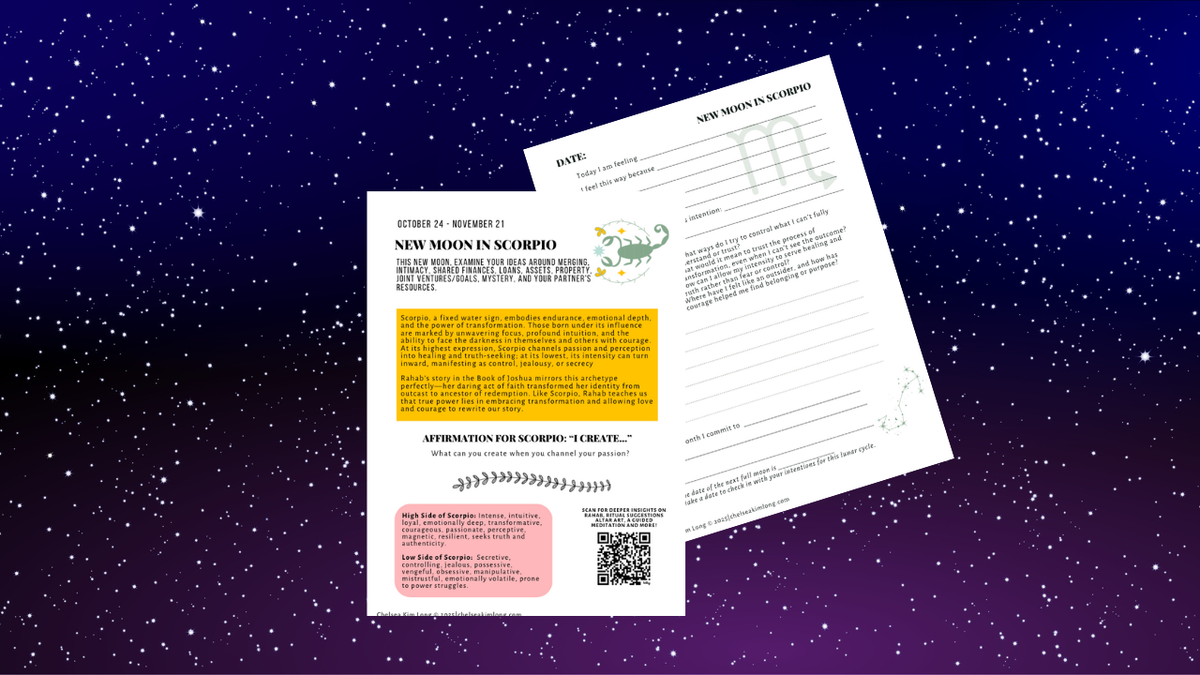New Moon in Scorpio: Rahab and the Intensity to Change Lineages
This new moon, examine your ideas around merging, intimacy, shared finances, loans, assets, property, joint ventures/goals, mystery, and your partner’s resources.

Scorpio, a fixed water sign, embodies endurance, emotional depth, and the power of transformation. Those born under its influence are marked by unwavering focus, profound intuition, and the ability to face the darkness in themselves and others with courage. At its highest expression, Scorpio channels passion and perception into healing and truth-seeking. At its lowest, its intensity can turn inward, manifesting as control, jealousy, or secrecy.
Rahab’s story in the Book of Joshua mirrors this archetype perfectly—her daring act of faith transformed her legacy from woman on the margins to ancestor of redemption. Like Scorpio, Rahab teaches us that true power lies in embracing transformation and allowing intuition and courage to change the trajectory of generations.
Rahab’s Story:
The Book of Joshua tells the story of Israel’s entry into the Promised Land, led by Joshua after Moses’ death. It includes the conquest of Canaan and the fall of Jericho, which is where we meet Rahab.
Joshua is a complicated book for the modern progressive Christian, as it portrays a seemingly genocidal god. The Women’s Bible Commentary brings forward the work of Robert Allen Warrior, a Native American scholar who points out that “in order to celebrate the strength of the conquering and delivering God of Joshua, the narrative erases evidence of Canaanite loss and pain.” The commentary continues: “Warrior’s comments clarify what is at stake for modern readers of the book of Joshua. If we ignore the worldview of the text, and the way that worldview is upheld by excluding other perspectives, we run the risk of maintaining structures of erasure that exist in the text and our modern world.” (1)
Rahab’s story begins in Joshua 2, where she is described as a prostitute living in Jericho. In her book In the Beginning Were the Women, Claire McKeever-Burgett adds nuance by imagining that Rahab chose the profession, rather than being forced into it, and that she is a wealthy and influential woman committed to community care.
Whether she was a social outcast or a well-connected woman, when two Israelite spies arrive in the city, they enter her establishment. She tells them that her people have heard the tales of the Exodus and are afraid of the impending invasion. She believes that God has given them the land. Throughout history she has been lauded as a prophetess with knowledge from God, but in Womanist Midrash, Volume 2, Wilda Gafney offers another perspective: “Perhaps Rahab knew that the fall of Jericho was inevitable through her own spy network, which was apparently much more reliable than that of the Israelites.” (2)
She hides the spies from the king’s soldiers and asks them to spare her family during the coming invasion. They agree and tell her to hang a red cord from her window as a sign. In Joshua 6, her household is noted as the only one spared. Gafney notes that Rahab joins the line of women deliverers in Exodus—alongside Shiphrah and Puah (the midwives), Miriam, and Jochebed, the mother of Moses (3).
Rahab and Scorpio:
Rahab’s story and her character embody Scorpio's ability to hold space for intensity, complexity, and moral ambiguity. Despite her unconventional role, she is praised throughout scripture and both the Jewish and Christian traditions. She is remembered three times in the New Testament:
- Matthew 1:5: In the genealogy of Jesus
- Hebrews 11:31: In the hall of faith
- James 2:25: She is praised for her actions of faith.
The Matthew genealogy is notable because in a highly patriarchal time, it includes Rahab, a prostitute responsible for the welfare of her entire household, as well as a few other women, including Ruth. “These women represent the socially vulnerable,” the Women’s Bible Commentary writes, “and at the same time Matthew, following the Scriptures of Israel, empowers them.” (4)
Although Rahab lied, her character traits are generally lauded in a variety of sources throughout history, and she is seen as a woman of valor (p111) Once again, she expands our vision for biblical womanhood. The commentary continues:
“These women...choose an Israelite affiliation, a choice that Matthew’s Gospel, with its interest in making disciples of all Gentiles/nations (28:19), commends...each [woman]—from a relatively powerless position—seeks justice not through violence but through cleverness.”
Scorpio and Rahab invite us to go deeper; to channel our intensity into generational change. We can trust that our intuition as invitation to the beginning of liberation, not just for us, but for those who come after.
Sources:
(1): Carol A. Newsom, Sharon H. Ringe, and Jacqueline E. Lapsley, eds., Women’s Bible Commentary, 3rd ed. (Westminster John Knox Press, 2012), 63
(2): Wilda C. Gafney, Womanist Midrash, Volume 2 (Louisville, KY: Westminster John Knox Press, 2024), 64.
(3): Gafney, Womanist Midrash, Volume 2, 63.
(4) Newsom, Women’s Bible Commentary, 467.
In terms of personality traits, each sign exhibits positives and negatives. It’s important to be aware of both, and to notice what you want to emphasize and what energy you can focus on in this season.
High Side of Scorpio: Intense, intuitive, loyal, emotionally deep, transformative, courageous, passionate, perceptive, magnetic, resilient, seeks truth and authenticity.
Low Side of Scorpio: Secretive, controlling, jealous, possessive, vengeful, obsessive, manipulative, mistrustful, emotionally volatile, prone to power struggles.
SUGGESTED MEDITATION FOR NEW MOON IN SCORPIO: TREASURES OF THE DARKNESS

Click to read more about the meditation and access the guide sheet.